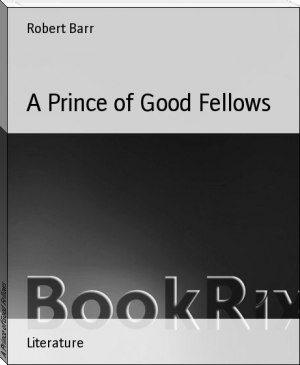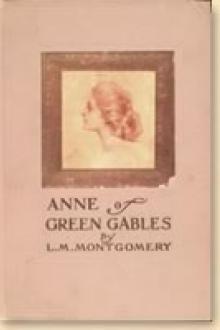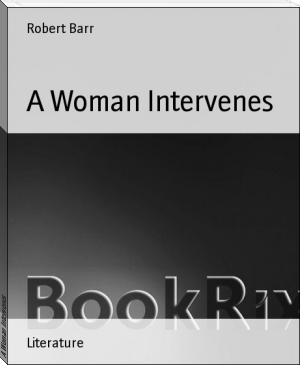A Prince of Good Fellows, Robert Barr [the red fox clan TXT] 📗

- Author: Robert Barr
Book online «A Prince of Good Fellows, Robert Barr [the red fox clan TXT] 📗». Author Robert Barr
"You said something of that sort, sir."
"You denied being a friend of the king's," persisted MacLeod, "and said you were but a small farmer near Stirling."
"I deny yet that I am a friend of the king. On the contrary, I don't mind confessing to you that I am the greatest enemy he has in the world, and it's well he knows it."
"You amaze me. Then you do not wish to meet the fleet."
"On the contrary, I do, and I ask you to order a suitable boat for me."
"You shall have the best boat in my possession," said MacLeod leaving them for a moment to give his command.
In a short time a large boat with ten oarsmen was waiting at the landing.
"They are ready for you," said MacLeod with an effort at geniality, which gave a most sinister effect to his face. "I am sorry to bid you good-bye, but I hope you bear away with you no ill will against Dunvegan."
"Sir," said the king ignoring his compliments, "that boat will not do for me."
"It is the best I have," said MacLeod looking at his truculent guest with new anxiety.
"The boat you must bring to the landing is the twenty-six oared barge, which Malcolm MacLeod builded so well."
The MacLeod stepped back two paces.
"That boat is for the king," he said in a voice scarcely above a whisper.
"Yes, it is for the king, therefore the king demands it. Give the order instantly that it be brought to the landing, well manned with twenty-six rowers."
All colour left MacLeod's face. His next words were to MacDonald.
"Is this true?" he said.
"Yes," answered MacDonald, "it is true."
The girl, her wide eyes distended with fear, clutched the arm of her lover. Even she knew this was a case for the headsman, but MacLeod, with not a quiver in his voice, called down to his followers,--
"Bring round the king's barge, and see it is well manned. I myself will take the rudder."
The stern face of the king relaxed as he saw this chieftain stand straighter than ever before since he had known him, ready to take on his head whatever might befall.
The girl impetuously flung herself at the king's feet, and in her excitement forgetting the limitations of his learning, she poured forth a plea for her father in Gaelic. The king smiled as he stooped and raised the suppliant.
"My dear," he said, "I shall never hear that language without thinking of you, and of my own discomfiture. If it were not that MacDonald stands there with that dour Highland look on his face, it is I would kneel at your feet. Your father is to come with me to Stirling, for I have said he should, and I must keep my word with myself as well as I have kept it with him. Do not draw away your hand, in spite of MacDonald's scowls, for I have this to promise you. If you and he will accompany us to Stirling, I pledge to you the king's word that I shall grant you whatever you ask. So you see you need have no fear for your father's safety." Saying this, the king, with that courtly manner which so well became him, gave the hand of the girl into that of MacDonald.
Thus it came about that the MacLeod took a voyage he had not intended, and came so unscathed from it that he long outlived the man who was the cause of his journey.
THE KING WEDS
Even a stranger in Stirling must have been impressed by the fact that something unusual was afoot, not to be explained by the mere preparation for ushering in the New Year. Inquiry soon solved the problem of the decorations and the rejoicings. James the Fifth, the most popular king Scotland had possessed since the days of Bruce, was about to be married, and most of his subjects thought it high time, for he had reached the mature age of twenty-six, and monarchs are expected to take a mate somewhat earlier than other folk. As the king, with a splendid retinue, was to depart shortly after the new year on a journey to France to claim his bride, the capital city flung its bunting to the breeze, and the inhabitants thereof pledged each other and the king in bumpers of exhilarating beverages; indeed all Scotland was following the example set to it by Stirling, for the marriage was extremely well liked throughout the land.
The king's father had linked himself to an English princess, and the Scottish people thought little of her. The precipitate marriage of this queen, only a few months after her husband's death, still further lowered her in public estimation. Scotland professed slight regard for Margaret of England, and was glad when her son refused the offer of his uncle, Henry the Eighth, to provide him with a wife. Indeed, James was at that moment the most sought-after young man in the world, so far as matrimony was concerned. The Pope, who now addressed him as Defender of the Faith, had a favourite candidate for his hand. Henry the Eighth was anxious that he should have all England to pick and choose from. The Emperor Charles the Fifth wished him to marry Princess Mary of Portugal; Francis the First of France was eager to supply him with a well-dowered bride. Never before had any youth such an embarrassment of choice, but James himself decided that he would go a-wooing to France, and his subjects universally applauded his preference. James's elderly relative, John, Duke of Albany, had married the heiress of De la Tour d'Auvergne, and the young king resolved to follow his example. Apart from this, James, in a manner, was pledged from the time he was three years of age, for Albany, when Regent of Scotland, had promised France that the young ruler should seek his consort in that country; so there had now been chosen for him Mary, daughter of the Duc de Vendome, who was reported beautiful, and, what was more to the purpose in a thrifty nation, was known to be wealthy.
This courting by all Europe might have turned the head of a less sensible young man than James, but he well knew the reason that so many distinguished persons desired his alliance. Henry the Eighth was at loggerheads with France; the Emperor Charles and Francis the First were engaged in one of their customary aimless wars, the advantage as usual inclining rather to the emperor's side. Scotland was at peace with itself and with all the world. The Scots were excellent fighters in whatever part of the world they encountered an enemy, and the strong fleet which James the Fourth had builded was augmented by his son and might prove a powerful factor in European politics. France and Scotland had long been traditional friends, and so this new mating aroused enthusiasm in both countries.
Thus Stirling put on gay attire and her citizens went about with smiles on their faces, all except one, and that one was James himself, who became more and more gloomy as the time for his departure approached. He had no desire to take upon himself the trammels of the matrimonial estate, and although his uncle, the strenuous Henry, was ultimately to set an example before the world of the ease with which the restrictions of marriage were to be shuffled off, yet at this time Henry himself was merely an amateur at the business, engaged in getting rid of Catherine of Arragon, a task which he had not yet succeeded in accomplishing. James had postponed and re-postponed the fateful journey; but at last he saw it must be taken, or a friendly country, one of the proudest on earth, would be deliberately insulted in the face of the world. Not only this, but his own subjects were getting restive, and he knew as well as they that a disputed succession in the event of his early death might lead to civil war. So, making the best of the hard bargain which is imposed on princes, where what should be the most endearing ties of human affection are concerned, James set his face resolutely towards the south, and attended by a brilliant escort, sailed for France. After a stormy voyage, for the month was January, the royal party landed in France, and was met by a company of nobles, only less splendid than itself in that a king was one of the visitors; for Francis had remained at Loches, to welcome his brother sovereign at that great and sinister stronghold, where the Court of France for the moment held its seat. Both time and weather seemed unpropitious for joyous occasion. News arrived at Loches that the French army had suffered defeat in its invasion of the Duke of Savoy's territory, and these tidings exercised a depressing influence on the welcoming delegation.
As the united escorts of France and Scotland set out on their journey to Loches a flurry of damp snow filled the air, raw from off the Channel, and the road proved wellnigh impassable through depth of mud. The discontented countenance of the king, who was wont to be the life of any party of which he was a member, lowered the spirits of his Scottish followers to the level of those saddened by military defeat and the horsemen made their way through the quagmires of Northern France more like a slow funeral procession than wedding guests.
At the castle where they halted at the end of the first day's journey, the King speedily retired to the apartment assigned to him without a word of cheer even to the most intimate of his comrades.
The travellers had accomplished only about twelve leagues from the sea-coast on their first day's journey, and darkness had set in before the horsemen clattered through the narrow streets of a little town and came to the frowning gates of a great castle, whose huge tower in the glare of numerous torches loomed out white against the wintry sky. The chief room of the suite reserved for the king was the only cheerful object his majesty had seen that day. A roaring bonfire of bulky logs shed a flickering radiance on the tapestry that hung along the wall, almost giving animation to the knights pictured thereon, sternly battling against foes in anger, or merrily joisting with friends for pleasure at some forgotten tournament.
The king, probably actuated by the military instincts of his race urging him to get his bearings, even though he was in the care of a friendly country, strode to one of the windows and looked out. Dark as was the night and cloudy the sky, the landscape was nevertheless etched into tolerable distinctness by the snow that had fallen, and he saw far beneath him the depths of a profound valley, and what appeared to be a town much lower than the one through which he had just ridden. The stronghold appeared to stand on a platform of rock which was at least impregnable from this side. James turned from the wintry scene outside to the more alluring prospect within the apartment. A stout oaken table in the centre of the room was weighted with a sumptuous repast; and the king, with the stalwart appetite of youth and health augmented by a tiresome journey in keen





Comments (0)